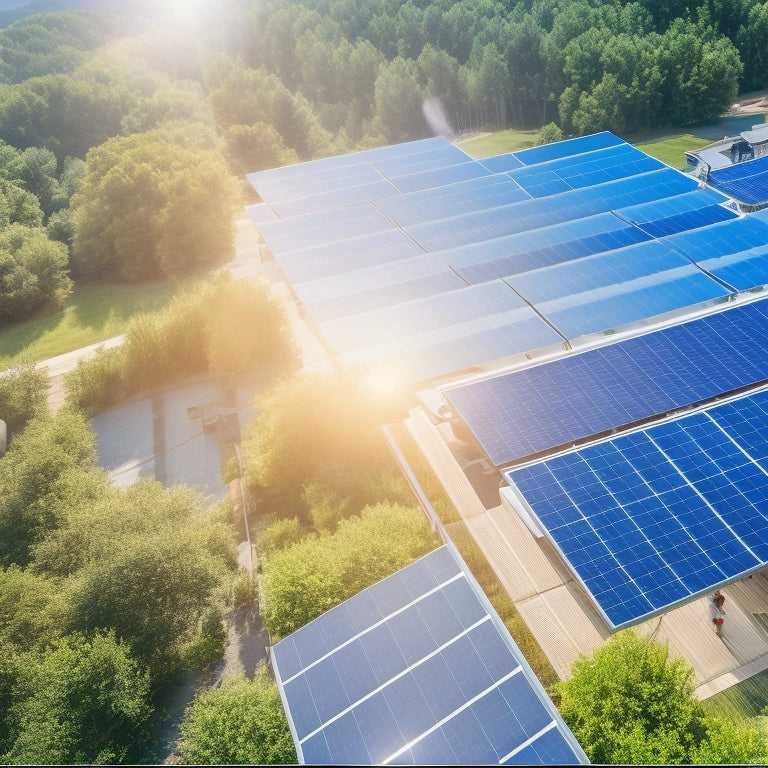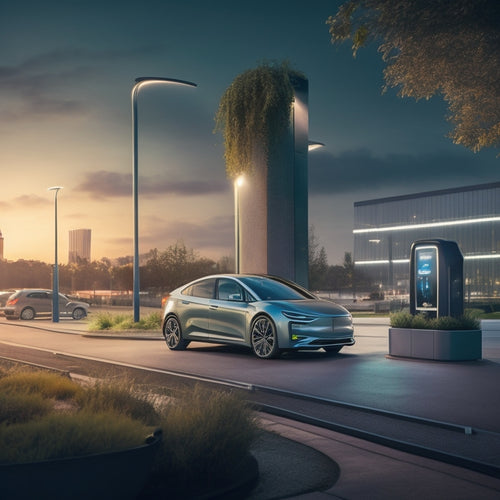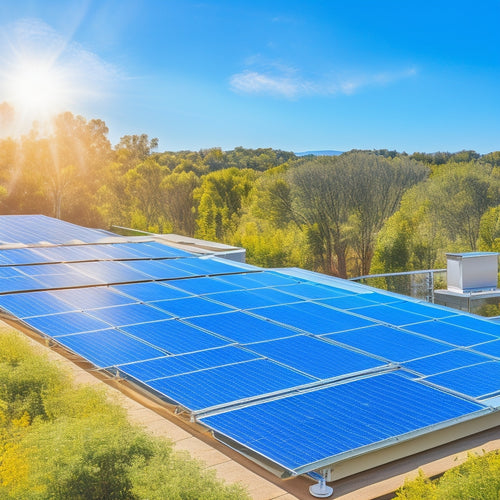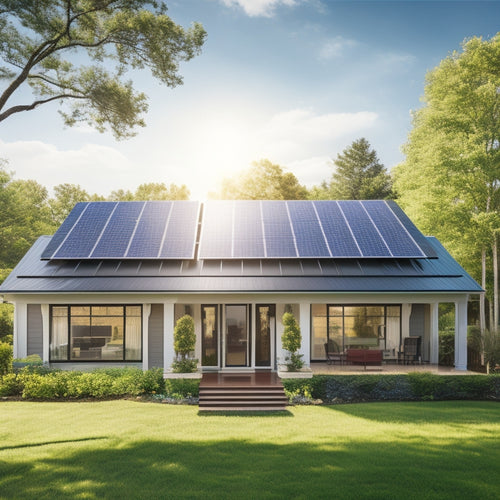
What to Consider for Commercial Solar Panel Installation
Share
When considering commercial solar panel installation, you need to evaluate several essential factors. Start with an energy needs assessment to determine the right system size, maximizing your savings. Look into available federal, state, and utility incentives that can offset costs and enhance your ROI. Selecting the appropriate solar panel type and inverter is vital for optimizing performance and efficiency. Consider the environmental benefits, including reduced carbon footprint and increased property value. Finally, understand your long-term energy forecasts to guarantee your investment aligns with future energy needs. Investigate how these factors can lead to significant savings and sustainability for your business.
At a Glance
- Assess your current and future energy needs to determine the appropriate size and capacity for your solar panel system.
- Explore available federal, state, and local incentives to maximize financial benefits and reduce installation costs.
- Choose the right type of solar panels and inverters based on efficiency, budget, and installation conditions for optimal performance.
- Evaluate the long-term environmental impact and potential property value enhancements associated with solar panel installation.
- Consider financing options to manage upfront costs and ensure a sustainable transition to solar energy for your business.
Cost-Effective Energy Solution
When you invest in commercial solar panel installation, you're not just looking at immediate benefits; you're tapping into significant long-term savings.
By evaluating your energy needs assessment, you can determine the ideal system size for your business, ensuring maximum efficiency and cost savings.
Various incentives and rebates can further reduce your initial costs, enhancing your return on investment.
Long-Term Savings Potential
As businesses increasingly seek ways to reduce operational costs, investing in commercial solar panel installation emerges as a smart, long-term financial strategy. By utilizing solar energy, you can markedly lower your electricity bills, providing a sustainable solution to the rising energy price trends. This is especially important in today's market, where energy costs are unpredictable.
Moreover, various financing options can make the shift to solar energy easier on your budget. From power purchase agreements (PPAs) to solar loans, these options allow you to pay for your system over time, minimizing upfront investment while securing long-term savings.
Here's a quick comparison of potential savings based on energy consumption:
| Annual Energy Consumption (kWh) | Estimated Annual Savings ($) |
|---|---|
| 10,000 | $1,200 |
| 50,000 | $6,000 |
| 100,000 | $12,000 |
| 250,000 | $30,000 |
| 500,000 | $60,000 |
Incentives and Rebates Available
Releasing the full potential of commercial solar panel installation often hinges on the various incentives and rebates available to businesses. These financial benefits can greatly reduce your initial investment, making solar an even more attractive option.
Start by exploring federal incentives, which include substantial tax credits that can offset a portion of your installation costs.
Don't overlook local rebates and state subsidies that can further enhance your savings. Many states provide performance-based incentives that reward you for the energy your system generates.
Additionally, utility incentives can offer rebates based on your system's size and output, further easing financial burdens.
Consider financing options such as low-interest loans and grant programs that help you manage upfront expenses.
You can also take advantage of depreciation benefits, allowing you to recover costs over time.
Renewable energy certificates (RECs) can provide an additional revenue stream by allowing you to sell the credits earned from your solar energy production.
Environmental Impact Reduction
Installing commercial solar panels greatly reduces your carbon footprint, helping you contribute to a cleaner environment.
By utilizing renewable energy, you not only lower operational costs but also play an essential role in combating climate change.
Furthermore, the enhanced property value and improved brand reputation linked to environmental responsibility can further drive your business's growth and sustainability efforts.
Embracing this technology positions your business as a leader in sustainability while reaping the benefits of eco-friendly energy solutions, including long-term savings.
Carbon Footprint Minimization
Switching to commercial solar panel installation greatly cuts down your carbon footprint, making a powerful statement about your commitment to environmental sustainability. By embracing this technology, you not only enhance your sustainability practices but also increase energy efficiency, leading to long-term benefits for your business and the planet.
Here's how solar panels contribute to carbon footprint minimization:
| Aspect | Impact on Carbon Footprint |
|---|---|
| Reduced Greenhouse Gas Emissions | Lowers overall emissions greatly |
| Decreased Fossil Fuel Dependency | Less reliance on non-renewable sources |
| Energy Cost Savings | Enables reinvestment in green initiatives |
| Enhanced Energy Efficiency | Optimizes energy consumption patterns |
| Long-term Sustainability | Promotes enduring eco-friendly practices |
Renewable Energy Benefits
Embracing commercial solar panel installation not only minimizes your carbon footprint but also brings significant renewable energy benefits that directly reduce environmental impact. By utilizing the sun's power, you're taking a bold step towards energy independence.
This shift not only lessens reliance on fossil fuels but also stabilizes energy costs, providing you with greater control over your energy future.
Moreover, investing in solar technology contributes to job creation within your community. The solar industry continues to expand rapidly, generating a wealth of employment opportunities in manufacturing, installation, and maintenance.
These jobs not only support local economies but also promote a sustainable workforce focused on innovative energy solutions.
By opting for solar panels, you're not just making a choice for your business; you're championing a movement towards a cleaner, greener planet.
Each panel installed represents a commitment to reducing greenhouse gas emissions, protecting ecosystems, and cultivating a healthier environment for future generations.
Choosing commercial solar is a proactive decision that aligns your business with a sustainable future, enhances your brand reputation, and strengthens your community.
Take that step today and enjoy the diverse rewards of renewable energy.
Key System Components Overview
Understanding the key components of a commercial solar panel system is vital for maximizing efficiency and performance.
Inverter types, such as string inverters and microinverters, play a significant role in how effectively energy is converted and employed.
You'll want to familiarize yourself with the different types of solar panels available and how inverter functionality directly impacts energy conversion.
Solar Panels Types
As the demand for renewable energy continues to rise, knowing the different types of solar panels is essential for making informed decisions about your commercial solar installation.
You'll typically encounter three main types: monocrystalline panels, polycrystalline panels, and thin film technology. Monocrystalline panels are well-known for their high solar panel efficiency and sleek design, making them a popular choice for businesses with limited roof space.
Polycrystalline panels, while slightly less efficient, offer a cost-effective solution with a longer solar panel lifespan.
Emerging technologies like bifacial solar panels allow you to capture sunlight on both sides, maximizing energy production. Flexible solar panels provide versatility, ideal for unconventional installations.
If you're considering aesthetics, building integrated photovoltaics seamlessly blend into your construction, enhancing both function and design.
When evaluating options, pay attention to solar panel warranties, as they indicate the manufacturer's confidence in their products.
Each type of solar panel employs distinct photovoltaic materials, impacting performance and longevity. Understanding these differences equips you to choose the best solution for your needs, ensuring freedom from high energy costs and a more sustainable future.
Inverter Functionality Explained
One vital component of your commercial solar panel system is the inverter, which plays an important role in converting the direct current (DC) generated by the solar panels into alternating current (AC) that your business can use.
Without an efficient inverter, you can't fully utilize the power of the sun to drive your operations.
There are several inverter types to evaluate, including string inverters, microinverters, and power optimizers.
Each type has its advantages, so understanding their functionalities is significant for maximizing your solar investment. For instance, microinverters can optimize the output of individual panels, making them a great choice if your installation has shading issues.
Inverter efficiency is another key factor in your decision-making process. A higher efficiency rating means less energy loss during conversion, which translates to lower energy bills and a quicker return on investment.
It's important to select an inverter that not only meets your energy needs but also complements your solar panel system's performance.
Assess Your Energy Requirements
To effectively assess your energy requirements, you'll need to evaluate your current energy usage by analyzing past utility bills and identifying peak consumption periods.
Start by tracking your energy usage across various appliances to pinpoint high-energy appliances and devices that may be driving costs.
It's also essential to forecast your future energy needs, considering potential business growth or changes in operations.
This thorough understanding will guide you in selecting the right solar panel system to meet your demands efficiently.
Evaluate Current Energy Usage
Before diving into the installation of commercial solar panels, it's vital to evaluate your current energy usage to understand your specific needs. Conducting an energy audit is the first step in this process. This assessment helps you identify your energy consumption patterns, revealing how much energy your business currently uses and when it peaks.
By analyzing your usage patterns, you can pinpoint areas where you might be wasting energy or where efficiency improvements can be made. For instance, do you notice spikes during certain hours or seasons? Understanding these trends allows you to tailor your solar panel installation to suit your unique energy profile.
Furthermore, this evaluation can influence the size and type of solar system you'll require, ensuring you generate enough power to meet your needs without overspending on unnecessary capacity. When you align your solar investment with your actual energy usage, you're not just saving money; you're also taking an important step toward energy independence.
Taking the time to thoroughly assess your current energy usage will enable you to make informed decisions about your solar installation and help you utilize the freedom that comes with renewable energy.
Forecast Future Energy Needs
Once you've evaluated your current energy usage, the next step involves forecasting your future energy needs. Energy forecasting is essential for understanding how your requirements will evolve over time.
Begin with a demand analysis that considers factors like potential business growth, changes in operations, or the adoption of new technologies. Think about how these elements might affect your energy consumption.
You'll want to project how much energy you'll need in the coming years. For instance, if you plan to expand your facility or increase production, your energy demands could rise considerably. Conversely, if you're implementing energy-efficient practices, your needs may stabilize or even decrease.
Accurate forecasting not only helps you size your solar panel system appropriately but also maximizes your investment. When you understand your future energy requirements, you can tailor your solar solution to meet those needs, ensuring you utilize the full potential of renewable energy.
Higher Long-Term Savings Potential
When you install commercial solar panels, you can considerably reduce your energy costs over time.
By utilizing solar energy, you'll decrease reliance on traditional electricity sources, leading to lower utility bills.
This shift not only elevates your bottom line but also enhances your business's sustainability profile.
Reduced Energy Costs
Reducing energy costs is one of the most persuasive reasons for businesses to invest in commercial solar panel installations. By utilizing solar energy, you can considerably cut down on your utility bills, freeing up funds for other vital aspects of your operation.
With the rise in energy prices, ensuring energy efficiency through solar solutions can provide a hedge against future rate hikes.
When you switch to solar, you're not just investing in technology; you're investing in a sustainable future. The initial installation costs may seem intimidating, but the long-term savings potential is considerable.
You'll notice a decrease in monthly utility bills and, in many cases, you might even achieve energy independence, allowing you to control your energy expenses better. Additionally, many regions offer incentives or rebates that can further reduce upfront costs.
Imagine reducing your operational expenses while contributing to a cleaner environment. Every kilowatt-hour generated by your solar panels decreases your reliance on traditional energy sources and directly impacts your bottom line.
In today's competitive environment, embracing solar energy isn't just smart; it's essential for achieving financial freedom and sustainability.
Frequently Asked Questions
What Permits Are Needed for Commercial Solar Panel Installation?
You'll need to check local zoning regulations and obtain the necessary permits for your commercial solar panel installation. Understanding these requirements can help you manage installation costs and guarantee compliance, maximizing your energy independence.
How Much Roof Space Is Required for Solar Panels?
You'll need about 100 to 400 square feet of roof space per solar panel, depending on solar panel efficiency and roof orientation. More space maximizes energy capture, giving you greater freedom to utilize solar power effectively.
Can Solar Panels Be Installed on a Flat Roof?
Yes, you can install solar panels on a flat roof. Flat roofs offer advantages like easier maintenance, but installation challenges such as proper drainage and wind resistance must be addressed to guarantee peak performance and longevity.
What Happens During Inclement Weather or Power Outages?
When storms rage, your solar system's efficiency can dip, but it's designed to withstand harsh weather. Regular maintenance guarantees it's ready when the sun returns, providing energy independence even during power outages. You'll stay energized!
How Long Does the Installation Process Typically Take?
The installation timeline usually spans several weeks. You'll steer through project phases like site assessment, permitting, and installation. Understanding these steps enables you to plan effectively, ensuring you're ready to utilize solar energy efficiently and confidently.
Explore More
To sum up, investing in commercial solar panel installation isn't just about immediate savings; it's a strategic move toward sustainable energy that benefits both your business and the environment. By considering the initial costs, energy requirements, and potential long-term savings, you'll see that solar energy can greatly reduce your carbon footprint while enhancing your bottom line. Embracing this technology now positions you as a forward-thinking leader in your industry, proving that sustainability and profitability can go hand in hand.
Related Posts
-

Solid State Batteries in Electric Vehicles
Solid-state batteries revolutionize electric vehicles by offering a longer lifespan and higher energy density than tr...
-

What Types of Solar Energy Devices Are Available
You'll find several types of solar energy devices available today, each customized to different energy needs. Photovo...
-

Home Solar Installation Cost
You're considering installing solar panels on your home, and the upfront cost is likely the biggest hurdle standing i...


